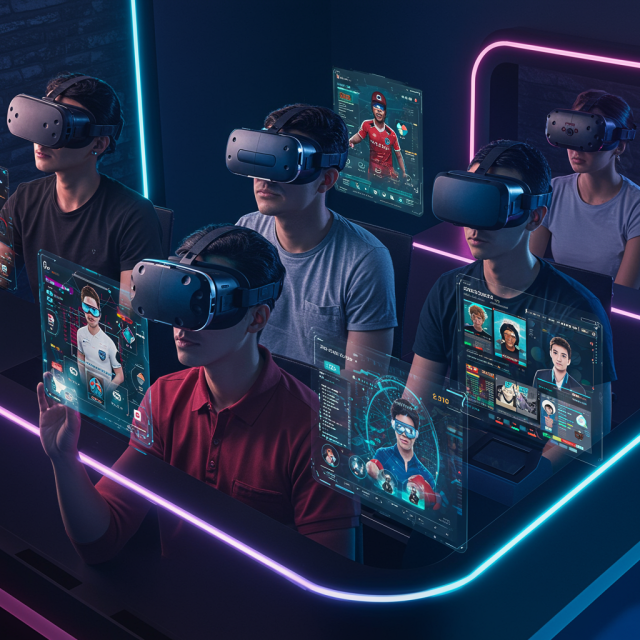Online betting has evolved rapidly over the past decade, but nothing matches the level of immersion and engagement that virtual reality (VR) brings to the wagering table. In 2025, VR technology is poised to revolutionize how bettors interact with sports events, casinos, and live deals—all from the comfort of home. This comprehensive guide explores the technology behind VR betting, its benefits, strategies to maximize returns, considerations for responsible play, and what the future holds for immersive wagering.
1. Understanding Virtual Reality & Its Role in Online Betting

Virtual reality refers to computer-generated environments that simulate physical presence in real-world or imaginary worlds. In online betting, VR creates immersive sportsbooks, poker rooms, and casino floors where users navigate and place bets as if they were on location. Key components include:
- VR Headsets: Devices like Oculus Quest, HTC Vive, and PlayStation VR deliver stereoscopic visuals and motion tracking.
- Motion Controllers: Handheld controllers or haptic gloves let users interact with virtual chips, cards, and betting interfaces.
- High-Performance Hardware: Fast GPUs, low-latency networks, and ergonomic designs ensure smooth, realistic experiences.
- Software Platforms: Proprietary or third-party VR betting apps power the environment, odds feeds, and secure transactions.
2. Key Benefits of VR in Online Betting
- Enhanced Immersion: Step into a virtual stadium or casino floor for a lifelike atmosphere that heightens excitement and engagement.
- Social Interaction: Chat with fellow bettors, cheer as a group, or sit at virtual poker tables with voice and gesture support.
- Innovative Markets: Access unique VR-only betting options like virtual prop bets tied to in-world events or avatar performances.
- Real-Time Analytics: Overlay live stats, heat maps, and predictive models directly within the VR environment for informed decision-making.
- Secure Transactions: Biometric logins and encrypted wagers boost security, reducing fraud and enhancing player trust.
3. Getting Started with VR Betting

Ready to dive into virtual reality wagering? Follow these steps to set up your immersive betting station:
- Choose the Right Headset: Balance budget and performance—mid-range options like Oculus Quest 2 offer wireless freedom, while PC-tethered HTC Vive Pro offers top-tier graphics.
- Secure a Stable Connection: A wired Ethernet or high-speed Wi-Fi ensures minimal latency, crucial for live odds and in-play markets.
- Select a VR Betting Platform: Look for licensed providers offering dedicated VR apps, transparent odds, provably fair systems, and prompt payouts.
- Fund Your Account: Many VR bookmakers support e-wallets, crypto deposits, and instant bank transfers—choose the fastest, lowest-fee option.
- Learn the Controls: Practice in demo rooms or low-stakes tables to get comfortable with navigating menus, placing chips, and interacting with avatars.
4. Advanced VR Betting Strategies
Immersive environments unlock new strategic dimensions beyond traditional screen-based wagering. Consider these tactics:
- Spatial Analysis: In sports VR, walk around 3D renderings of pitches or courts, inspect player positions, and bet on micro-events like press coverage or defensive gaps.
- Live Trader Tables: In VR casinos, observe dealer behavior, facial cues, and shuffle patterns in blackjack or roulette before placing larger bets.
- Peer Collaboration: Join or create VR private rooms to discuss odds, pool resources, and share insights in real time, replicating an expert syndicate feel.
- Dynamic Hedge Betting: Use on-the-fly VR overlays showing real-time ROI curves; hedge losing positions with counter-bets in a separate virtual zone.
- Prop Bet Tournaments: Enter VR‐only prop leagues that reward predictive accuracy, not just single‐event outcomes—earn badges and bonus multipliers.
5. Choosing Safe & Reliable VR Betting Platforms
As VR betting matures, platform selection becomes critical. Focus on these criteria:
- Licensing & Regulation: Ensure operators hold reputable gaming authority licenses (e.g., UKGC, MGA) and adhere to strict fairness audits.
- Technical Stability: Platforms should offer seamless updates, cross-platform compatibility, and minimal downtime for live events.
- User Reviews: Check community forums, social media, and independent VR gaming sites for feedback on graphics quality, payout speed, and customer support.
- Payment Options: Multiple deposit/withdrawal methods, including crypto, e-wallets, and instant banking, provide flexibility and privacy.
- Security Features: Look for SSL/TLS encryption, two-factor authentication, biometric verification, and provably fair game mechanics.
6. Ensuring Responsible Play in VR
The immersive nature of VR can intensify gambling impulses. Adopt these responsible gaming practices:
- Session Limits: Use built-in VR timers or reality checks that pause the game after preset durations.
- Budget Controls: Predefine deposit and loss limits in your account settings, and enable mandatory cool-off periods.
- Self-Exclusion Tools: Reputable VR platforms offer instant self-exclusion or time-out features to curb excessive play.
- Support Resources: Access links to helplines, counseling services, and peer support groups directly within the VR lobby.
- Mindfulness Breaks: Schedule VR cooldown rooms—tranquil virtual environments for stress relief and perspective.
7. The Future of VR Betting Beyond 2025
While 2025 marks mainstream adoption, the horizon holds even more innovation:
- Augmented Reality Integration: Blend VR with AR glasses to overlay live odds onto real-world sports events or home TV broadcasts.
- AI-Driven Environments: Personalized VR rooms adapt lighting, sound, and challenges based on your betting history and risk appetite.
- Cross-Platform Metaverses: Enter shared virtual worlds where sports, casinos, eSports, and social hubs converge in a persistent economy.
- Haptic Feedback Advances: Full-body suits and gloves simulate physical sensations—deal cards with tactile realism or feel the roar of a virtual crowd.
8. Conclusion
Virtual reality is set to redefine online betting, offering unprecedented immersion, social engagement, and strategic depth. By equipping yourself with the right hardware, choosing licensed VR platforms, applying advanced wagering strategies, and prioritizing responsible play, you can ride the wave of this transformative trend in 2025 and beyond. Embrace the virtual frontier of online betting and experience the future of wagering today.
Blockchain and cryptocurrency are transforming the online betting industry. To learn more about the impact of blockchain technology on online casinos, check out our detailed guide.










